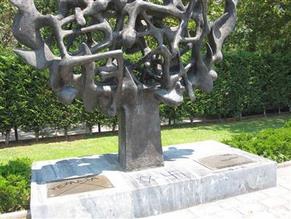|
World Jewish News

Unidentified perpetrators daubed the bronze plaque in memory of the 50,000 Jews killed during the Holocaust with the words ''That's a lie", a Star of David and a swastika. Photo: KIS
|
Holocaust Memorial in Thessaloniki, Greece, desecrated
22.06.2011, Anti-Semitism The Holocaust Memorial of Thessaloniki, in northern Greece, was vandalized with swastika and anti-Semitic slogans.
Unidentified perpetrators daubed the bronze plaque in memory of the 50,000 Jews killed during the Holocaust with the words "That's a lie", a Star of David and a swastika.
This act coincides with the decision of the City Council of Thessaloniki to bestow on Monday the City’s highest decoration to 30 Holocaust survivors still living in Thessaloniki.
The Central Board of Jewish Communities in Greece (KIS) and the Jewish Community of Thessaloniki issued press releases condemning this anti-Semitic attack and urging the authorities to take all necessary measures in order to apprehend the culprits.
Greek Education Minister, Anna Diamantopoulou, the City Council of Thessaloniki as well as the local Mayor Giannis Boutaris issued public statements condemning the vandalism.
The city's memorial service for the about 30 survivors still living in Greece's second city was said to be the first in 65 years.
Thessaloniki's new mayor Yannis Boutaris, who defeated the conservative candidate in local elections last year, is seeking to highlight the city's multicultural and religious past at the crossroads of the southern Balkans.
by: Maureen Shamee
EJP
|
|
